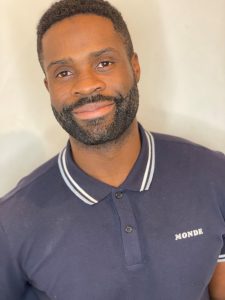Biography

I was born in Haiti and came to Coquitlam in 1991. After completing high school, I enrolled in university without a clear career plan. Shortly after starting school, my situation changed and I was forced to withdraw from university to pursue a trade, working as a plumber for 6 years. During that time, I realized that I really enjoyed training new apprentices. When someone suggested that, since I enjoyed training and giving back, perhaps I would enjoy being an educator, I began to consider education as a career. The seed was planted and there was no going back. Not long after that conversation, I took the plunge and enrolled at Douglas College followed by a 2-year program with BCIT’s TechEd Department. After completing my Diploma at BCIT, I enrolled in the Teacher Education Program at UBC, receiving my Bachelor of Education and becoming a full-time teacher.
After completing my Physical Education diploma at Douglas College, I was hired by Langley School District to teach TechEd and P.E. As I slowly gained experience with TechEd, I became increasingly interested in curriculum design. This passion for technology education led to more work in Applied Design, Skills, and Technology (ADST) with the District. After that, I became the Department Head of ADST in Langley Secondary School. I worked with my department on lots of interesting projects and also explored options for cross-curricular activities between departments with a special focus on STEM. We developed partnerships among our family of schools (elementary, middle, and secondary) to promote mentorship, improve literacy, and support interdisciplinary learning.
After several years of teaching, I returned to Yorkville University and completed a Master of Education in Educational Leadership. As part of my degree requirements, I conducted action research looking at how teachers can use community partnerships to engage students in ways that lead to self-advocacy. I’ve been excited to use the findings from this in my own school in my current role as Vice-Principal of D.W. Poppy Secondary.
Meeting Aaron
What is your most memorable experience from your time in the Faculty of Education?
Dr. Bathseba Opini’s Aboriginal Education course. This was where I began to take part in conversations around race, gender, and inclusion. I think part of the reason I enjoyed the course came from the fact that it tied into some movements I’m quite passionate about, such as diversity and inclusion. Having a Black educator helped me realize that there are people who look like me in these roles. Representation is important and the experience really resonated with me. This understanding of representation comes with a lot of responsibility. Knowledge begets teaching, and it’s important to use this knowledge to give back and support other BIPOCs. My experience with Dr. Opini has shaped my views as an educator and administrator, and I try to make every person feel safe and included in education.
Where has your education from the Faculty of Education taken you in your career?
I’ve learned about the power of education. Oprah Winfrey has said, “Education is the key to freedom.” I couldn’t agree more.
Where do issues of inclusion find a place in your life or at work?
Inclusion affects every area of my work. If we don’t tackle issues of race, sexuality, gender identity, and other areas of discrimination, we will not eradicate them. We must address these issues head-on. In every area of my work and life, I’m acutely aware and I work hard to improve inclusion in my school.
Do you have any words of wisdom for current students? Newly graduated folks?
The first couple of years of teaching can be compared to new drivers with an N license. At the time, we think we’re good drivers; however, in hindsight, we see our inexperience and less-than-stellar driving habits. As new teachers, we mess up and make mistakes (sometimes more than a few) – and that’s okay.
These mistakes will happen. They don’t mean you are a bad teacher or picked the wrong profession – they just mean you lack experience. With time, everything becomes easier. Some people may feel they are failing, but as educators, we shouldn’t use the word “failure”. It doesn’t capture everything that has happened in that scenario: the growth, the wins, the learning opportunities. There is more to our story as teachers than our mistakes. Looking at the situations that shaped us as opportunities for continuous learning helps us develop gratitude, resilience, and a lifelong love for education.
Similarly, it is important to remember our mentors and heroes also make mistakes. If we put these people on pedestals and become too impressed with their accomplishments, we can focus too much on accolades. Instead of idolizing individuals, we should be passionate about movements – equality, social justice, anti-racism – and become involved in the lifelong process of supporting the progress of initiatives we believe in.
A fitting quote, and one which I think sums up this idea: “Become less impressed and more involved.” – Matthew McConaughey.